Dear friends,
Greetings from the desk of Tricontinental: Institute for Social Research.
Every morning, I open the newspapers (now on apps rather than print) and read about atrocities taking place across the world. There is an inflation of pain, from the genocide in Gaza to the war in Sudan and the unreported chaotic violence in and around Myanmar. These conflicts seem interminable and might even confuse the casual observer who does not follow them closely.
The current phase of Sudan’s war began in April 2023, with the Sudanese Armed Forces (led by General Abdel Fattah al-Burhan) arrayed against the Rapid Support Forces (led by Commander Mohamed ‘Hemedti’ Hamdan Dagalo). In Myanmar, the conflict heated up in October 2023, when the military (known as the Tatmadaw) faced a renewed insurgency from the Chinland Defence Force, the People’s Defence Force, and the Three Brotherhood Alliance, which, as of May 2024, have cumulatively seized just over a third of the country’s territory. Meanwhile, in Gaza, the tripartite alliance of Israel, the United States, and Europe continues its genocidal extermination of Palestinians. Even the newspapers have stopped reporting the details of these atrocities, their readers turning away from stories of death and destruction. The contests of U.S. President Donald Trump and his erstwhile henchman Elon Musk are far easier to palate.
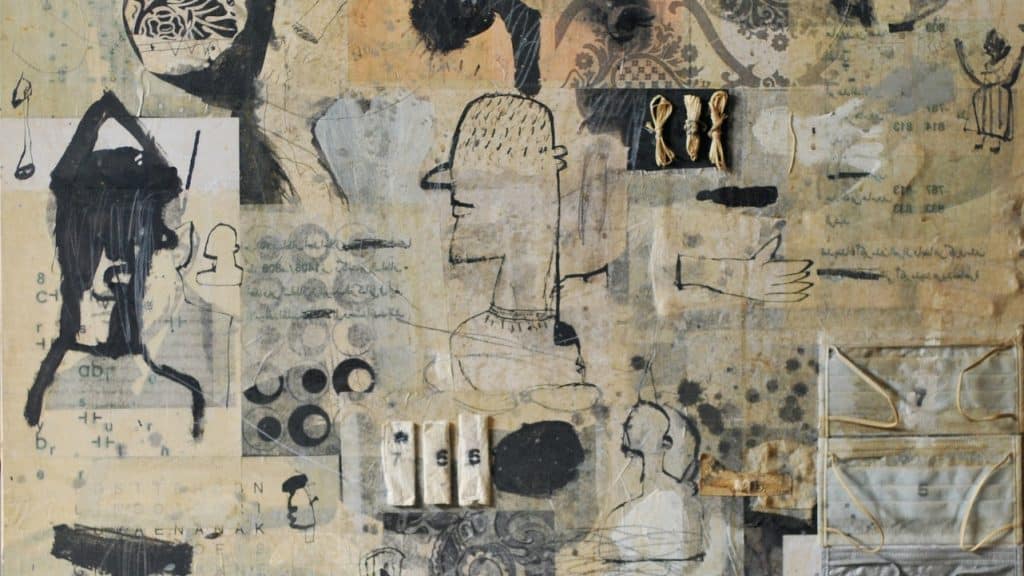
Mahmud al Obadi (Iraq), Untitled, 2008.
As war ravages the planet, more people are going hungry than last year—even as global food production has increased. Yet there is not much that divides the structural murder caused by hunger from the conjunctural murder caused by war. Suffering howls in the bowels of the Global South, where most of the addresses of pain remain. But this suffering is not inchoate or without logic. Palestine, Sudan, Myanmar—each has a story that can be told. It is weakness of the spirit that might lead people to throw up their hands in despair and blame this violence on fate or inexplicable human behaviour. Such an attitude allows the moral philosophers to escape from the world and diagram morality with such mathematical exactitude that they no longer have to pronounce judgment on it.
Are they afraid to condemn the killers bluntly, in plain language? Among these killers are arms dealers who claim that they merely sell the weapons, thereby negating their own culpability. Those who sell bullets are no longer considered any more dangerous than those who sell high fructose corn syrup.
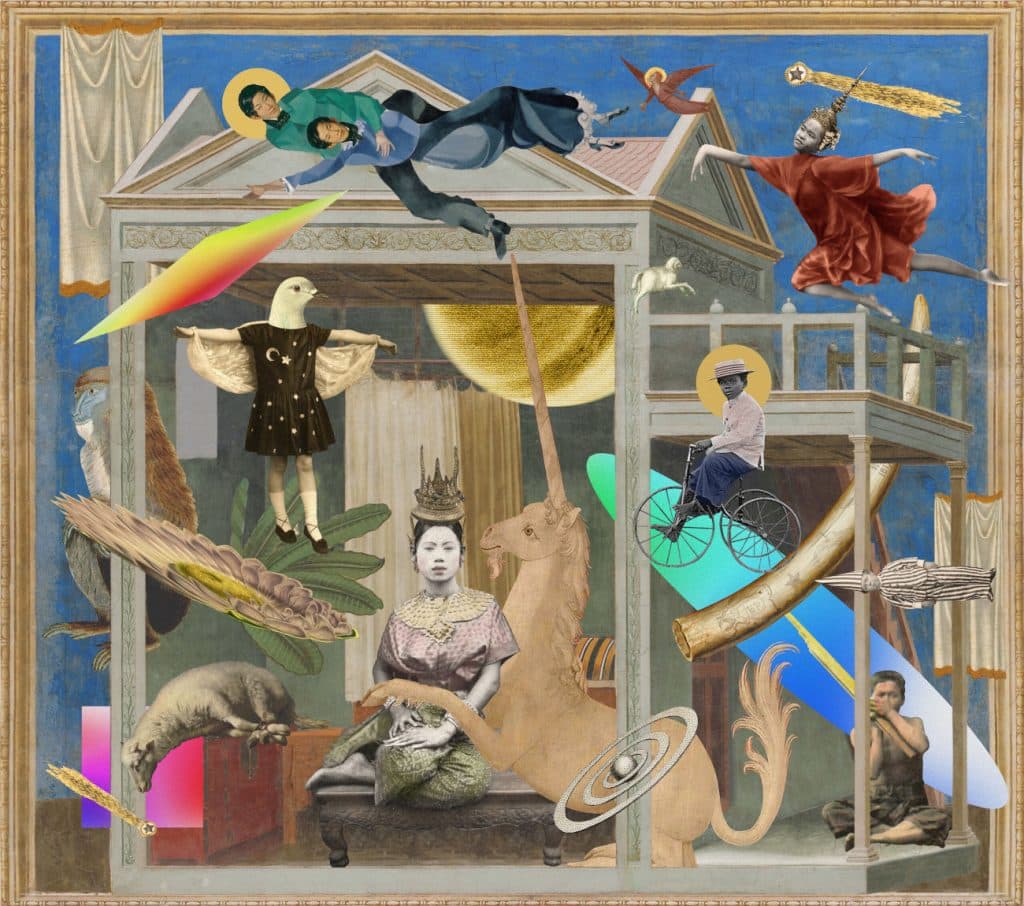
Nakrob Moonmanas (Thailand), A Unicorn in the Room, 2024.
One of the aims of our institute and this newsletter is to trace, as frequently as possible, the actuality of injustice in the world and to highlight the lines drawn by the movements taking action to reverse the ugliness inflicted upon humanity. We hope that you find our newsletters useful, share them with others, and ask them to subscribe. It is not often that we come to you and ask you to do this—or even to assist us with resources to keep our institute afloat.
There are two clear ways to help our institute: first, with material resources (such as donations that would be very, very welcome) and second, with voluntary labour through your research, editing, translation, and interpretation skills. If you would like to make a regular donation, you can do so here or by writing to Tariro Takuva, the head of our operations department, at [email protected]. We are grateful to the many collectives, volunteers, and publications that regularly translate our work into a range of languages, from Arabic to Hindi, Spanish, Portuguese, Mandarin, Italian, French, Korean, German, and Romanian. Their work encourages us to keep going. If you are interested in volunteering to translate our publications into these or other languages, or volunteering as an editor, please write to [email protected]. If you are interested in volunteering your research skills, write to me at [email protected]. If you are interested in volunteering as an interpreter, write to [email protected].
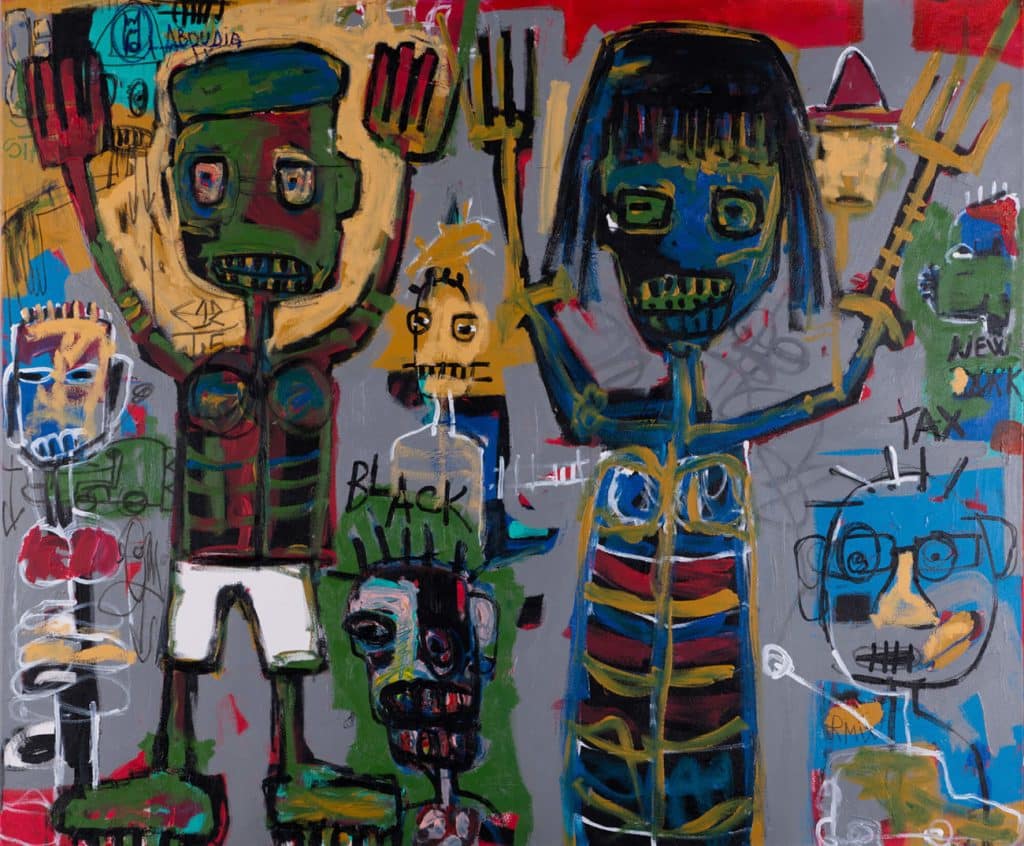
Aboudia (Côte d’Ivoire), Untitled, 2017.
In addition to our weekly newsletter, our institute produces four additional ones—three rooted in the three continents of our work (Asia, Africa, and Latin America) as well as one produced by our European partners at the Zetkin Forum for Social Research—and an art bulletin:
- Tricontinental Pan Africa. The monthly newsletter from Tricontinental Pan Africa features voices from across the continent on a range of issues, from Marion Ouma’s essay on the austerity cuts against social care to Blaise D. K. Tulo’s reflections on Ghana’s elections. In the most recent newsletter, the musician Seun Kuti writes about the making of his new album with Egypt 80, Heavier Yet (Lays the Crownless Head), and the need for art to engage with socialist ideals:
For the past ten years in my career, I’ve tried hard to write albums that speak from poor and working-class perspectives. While music can be about life’s joys and allow listeners to shake off their stress, that kind of music doesn’t tell the whole story of who we are and what we go through. Too much music, in its form and content, revels in the comforts of the world and can function like anaesthesia. I often say to my friends, if an alien came to Earth and looked at mainstream African art, the alien would believe that everything is fine. Arguably, it might be a good thing for the alien to perceive us in a positive light, since Africans are also fed up with being seen as perpetually troubled, but the alien’s assessment of our lives would be incomplete and untrue. Art must be rooted in honesty. That need to be honest has emboldened me to speak about things hidden by the mainstream narrative in my music.
- Tricontinental Asia. The fortnightly newsletters from the team in Asia run the gamut from Elizabeth Alexander’s letter on the fight against patriarchy and capitalism in South Asia to Atul Chandra’s reflections on peace. A recent newsletter written by the former General Secretary of the All Nepal Peasants’ Federation Pramesh Pokharel analyses the reasons behind the country’s constitutional crisis, marked by a rising monarchist opposition and a weakened left. ‘The world watches’, Pramesh writes, ‘as one of the youngest republics struggles to navigate this precarious moment’. He hopes that the crisis will spark further intellectual reflections on Nepal, intensify the battle of ideas, and strengthen the class struggle.
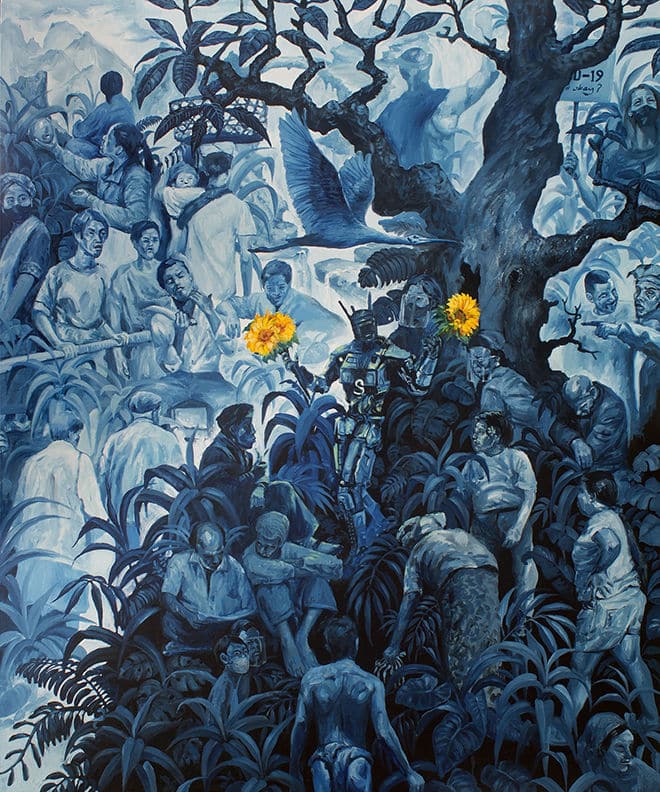
Agus Saputra (Indonesia), Hope #2, 2020.
- Tricontinental Nuestra América. When our institute was being conceptualised a decade ago at the Second International Dilemmas of Humanity Conference, we decided to build offices in Buenos Aires and São Paulo, largely because we wanted to be rooted in both Spanish- and Portuguese-speaking Latin America and in the continent’s largest country, Brazil, which is home to the Landless Workers’ Movement (MST): the region’s biggest mass movement. Over the past few years, we have been expanding operations and our network of collaborators, building an agenda for all of Nuestra América—‘Our America’. The first newsletter, written by Miguel Enrique Stédile (Tricontinental) and Stephanie Weatherbee Brito (International Peoples’ Assembly), reports on the Fourth International Dilemmas of Humanity Conference, held in São Paulo in April 2025. The aim of the conference was to help build a new development theory for the Global South, which, the authors write, ‘must be rooted in popular struggles, adapted to each context, and, above all, build the necessary power to make them a reality. In the face of the civilisational crisis we live in, socialism is not a distant utopia: it is the only compass to navigate towards a future where the economy serves the people and not capital’.
- Zetkin Forum for Social Research. Our European outpost, the Zetkin Forum, is based in Berlin and produces a monthly newsletter in German and English. The most recent shares an extract from the Zetkin Forum’s new journal, Fascism Rising; both welcome us to Berlin for the conference Fascism Back in Europe? from 20 to 22 June. See you there.
- Tricontinental Art Bulletin. Over the past decade, our institute has worked hard to make sure that we integrate the battle of ideas with the battle of emotions, that art does not operate merely as decoration. Since March 2024, our art department has produced a monthly bulletin to provide a richer context for art produced in the tradition of national liberation. These bulletins, written by our institute’s art director Tings Chak, are based on interviews with contemporary artists as well as deep dives into the archives of revolutionary art from around the world. The most recent bulletin, ‘Poetry against Fascism’, opens with a discussion about the Soviet Union’s Olga Bergholz and closes with India’s Sarojini Naidu. ‘We, who are not free yet’, Naidu wrote, ‘salute you who vanquished the tyrant’.
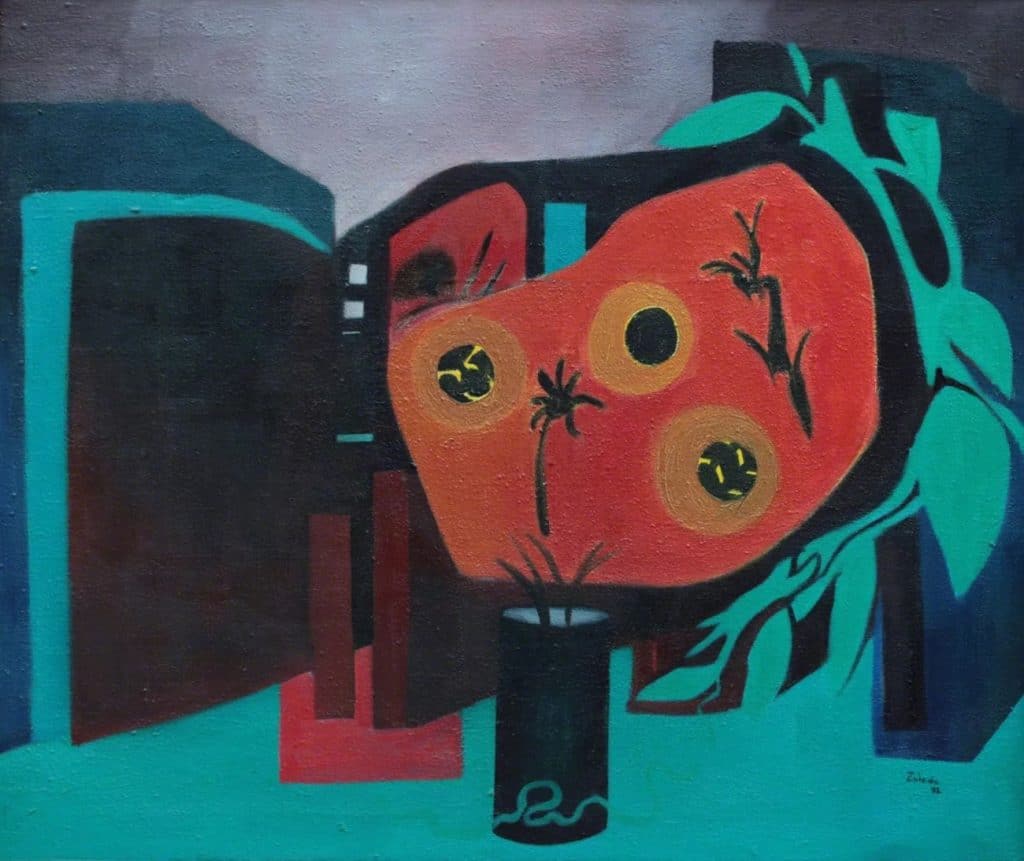
Zubeida Agha (Pakistan), Urban Landscape, 1982.
These texts—and this newsletter, which you receive each week—are designed to contribute to a roadmap that allows us to grasp the rapid changes before us. Our researchers are focused not only on the totality—all elements of human life, from the economy to culture—but also on the ways those elements interact to comprise that totality. No element must be seen as isolated, as somehow not integrally related to the others.
During the ten years since the Second International Dilemmas of Humanity Conference, we have produced a considerable body of research rooted in the struggles of our time—tracking the conjuncture, analysing the shifts in the neocolonial structure, and engaging in the battle of ideas that shapes our historical moment. We have a great deal of work yet to do: continue building our inventory of information on the present, systematise it into a theory of the present that illuminates possible futures, and do so always in dialogue with the forces of social transformation. We hope that you will continue to accompany us on this journey.
Warmly,
Vijay

